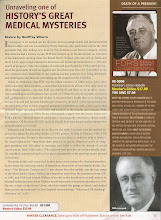The vaunted NYT did not see fit to publish my response to Lawrence K. Altman's subltle yet effective hatchet job of our book. Today they feature an article bluntly stating the Alzheimer's disease is "untreatable".
Perhaps hey will publish this letter, timely submitted.
http://www.nytimes.com/2010/12/18/health/18moral.html?_r=1&hp
Dear Editor,
First of all, Alzheimers is not untreatable as the author bluntly states. There are two classes of drugs that have proven efficacy, albeit modest, that reduce progression and slow disability. Patients with early diagnosis might opt to begin these medications "off label" since they are only indicated for moderate to severe disease. I know I would.
A good analogy analogy here is that, just like drugs for baldness, early use may not regrow brain cells, but can reduce the frequency of dropout. Early diagnosis and provision of patients with all therapeutic options is essential, not only for dementia, but for all disease. With current understanding, genetic counseling is an important adjunct to medical treatment.
The days when patients not being informed of disease such as maligancies are thankfully coming to an end (though not as fast as some might think, especially in Japan!) The prevalence of AD (50% at age 85) mandates aggressive, state-of-the-art, measures at prevention of progression.
Steven Lomazow, M.D.
Assistant Professor of Neurology
Mount Sinai School of Medicine
President, Neurological Association of New Jersey
Saturday, December 18, 2010
Subscribe to:
Post Comments (Atom)





A degenerative brain disease of unknown cause that is the most common form of dementia, that usually starts in late middle age or in old age, that results in progressive memory loss, mood swing and and changes personality. Best alzheimer's treatment
ReplyDelete